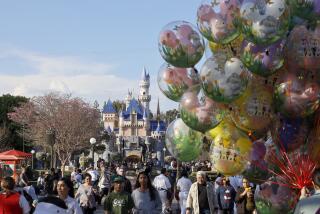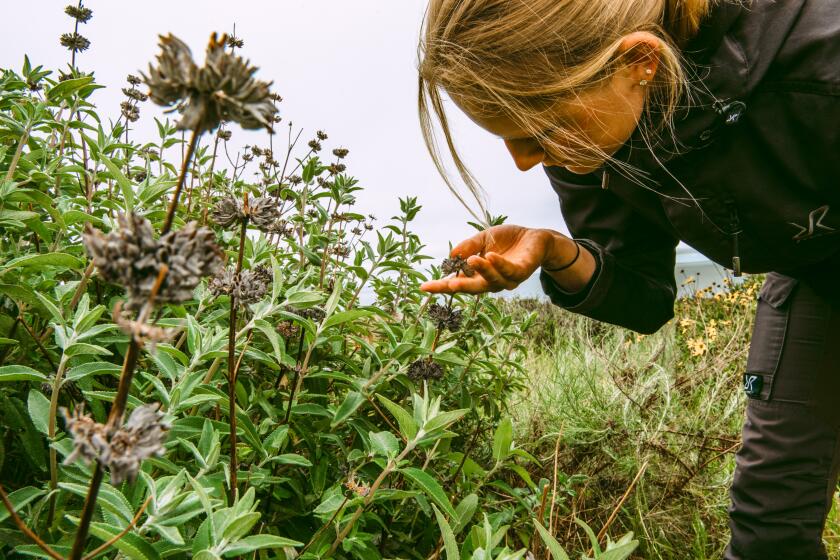Paper or plastic -- better yet, neither
I have an embarrassing confession to make. I have used plastic grocery bags in the last 30 days.
As a director of the local environmental group Heal the Bay, part of my job is to educate everyone about the ecological and economic harm caused by single-use shopping bags. I craft message points urging people to give up disposable bags in favor of reusable totes. Yet there I was, skulking out of my neighborhood market during Thanksgiving weekend with two enormous handfuls of plastic, praying that no one who knew me would catch me red-handed in the parking lot.
For the record, I had my wife’s car, and she doesn’t carry reusable bags. At the checkout stand, I was distracted by mediating a wrestling match between my rambunctious sons and missed my chance to request paper bags.
My relapse illustrates the challenges environmental groups face in moving beyond honed policy statements to change everyday behavior. Shoppers may comprehend rationally the need to alter their consumption habits, but the siren call of “convenience” and the pressures of daily life -- unruly kids and all -- conspire against the best intentions.
You probably know the arguments. According to county statistics, L.A. uses more than 6 billion one-time plastic bags a year, with only 5% of that total being recycled. The rest become a costly public waste problem that hogs precious landfill. The bags haunt our public spaces like ghosts, blowing across roadways, parks and schoolyards. The non-degrading bags choke streams and oceans, threatening marine life.
Disposable bags pose economic problems as well. San Francisco figured the cost of collecting and disposing the bags dispensed there at 17 cents a bag. One maker of reusable bags calculates that you could drive one mile on the petroleum required to make 14 bags; in the U.S., it’s estimated we consume about 100 billion bags a year.
OK, what about paper bags instead? They’re made from farmed trees, they degrade and they don’t enter the litter stream as readily as plastic grocery bags, but they are still not recycled in great numbers, and they require large amounts of fossil fuels and water to produce and distribute.
Biodegradable plastic bags made of soy and corn byproducts are more environmentally friendly, but they cost retailers more than plastic bags, and although they can be composted out of existence by users, most of us aren’t composters. They also don’t break down in the marine environment, which lacks the necessary heat and bacteria to initiate degradation.
So what should consumers do? Faced with conflicting and complex choices, most do what comes naturally -- they default to the status quo.
In my household, my wife likes her plastic bags and is reluctant to give them up. She packs our sons’ lunches in them when they go on a school field trip. She uses them to line her trash cans. They are handy for picking up after our two dogs when she takes them for a walk. Plus she thinks she saves money (and the environment) by reusing rather than buying bags.
I politely point out that even reusing the bags won’t solve the problem. Not enough of us do it, and even if we improve that, one-time reuse doesn’t touch the rest of the costs associated with the bags. Reusable totes are simply the best environmental alternative, given that each heavy-duty bag can replace 1,000 plastic bags over its lifetime. Be it disposing of pet droppings or kitchen waste, it’s better to buy and use alternatives than to reuse plastic bags.
My wife and millions of other Angelenos won’t change their ingrained habits overnight, but we know it can happen. Not too long ago, smokers would routinely light up cigarettes in crowded restaurants or airplanes. There was a time when buckling-up car safety belts was the exception rather than the rule.
Every change, however, requires a starting point.
To that end, on Dec. 20, a coalition of retailers, environmental groups and local governments have declared “A Day Without a Bag” in Los Angeles. Next Thursday, shoppers and those of us just making our daily rounds are urged to make a gift to the environment by forsaking paper or plastic bags in favor of reusable totes. The city and county will be supplying free reusable bags at many shopping centers (see healthebay.org/nobagday for details).
A growing number of nations and municipalities are tackling the bag problem head-on. San Francisco and Paris recently enacted bans on retail use of plastic bags. Ireland has reduced its consumption of plastic bags by 90% since 2001 via a bag tax and an awareness program that encourages shoppers to bring reusable totes.
Similar programs could work in L.A., and the county Board of Supervisors is mulling a number of legislative options to curb the use of plastic grocery bags. But we should take the first step. I’ll see you in the parking lot -- plastic- and paper-bag-free -- on Dec. 20.
More to Read
Start your day right
Sign up for Essential California for news, features and recommendations from the L.A. Times and beyond in your inbox six days a week.
You may occasionally receive promotional content from the Los Angeles Times.






